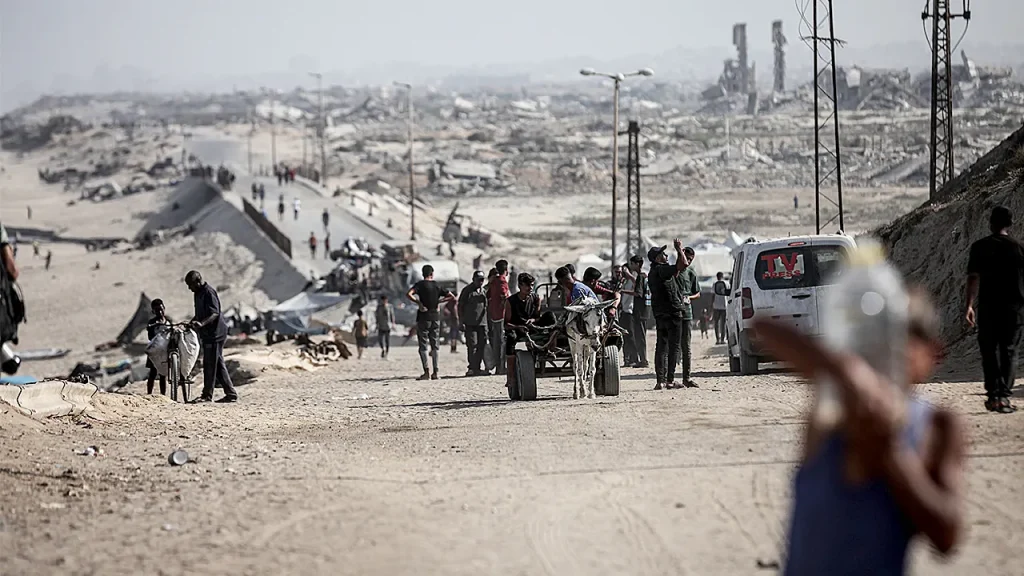Israel Receives Remains of Three Hostages from Hamas, Confirms Recovery Efforts Ongoing
In a solemn development from the ongoing Israel-Hamas conflict, Prime Minister Benjamin Netanyahu’s office announced Sunday that Israel has received the remains of three Israeli hostages from Hamas through the Red Cross. The statement confirmed that these remains were recovered through a joint operation between the Israel Defense Forces (IDF) and Shin Bet intelligence agency inside Gaza. This recovery marks another painful chapter in the ongoing hostage crisis that has devastated families and gripped the nation since the conflict began. The government’s announcement indicated that the bodies will be transferred to Israel where they will receive proper military honors in a ceremony officiated by the chief military rabbi, reflecting the nation’s deep respect for those who have been lost in this conflict.
Following the ceremonial honors, the remains will be taken to the National Center of Forensic Medicine under the Ministry of Health for formal identification procedures. This meticulous process is essential not only for official confirmation but also provides a measure of closure for families who have been living in agonizing uncertainty. The government statement noted that families of the deceased hostages have already been informed of the recovery, though the identities of the hostages have not yet been publicly released. In expressing “deep condolences,” the government acknowledged the profound grief these families are experiencing, stating that “hearts are with them at this difficult time.” This careful approach to notification reflects the sensitivity surrounding these recoveries and the respect for the privacy of grieving families.
The recovery of these hostages’ remains brings into sharp focus both the human toll of the conflict and the complex challenges facing both military operations and diplomatic efforts to secure the release of those still being held. Since the beginning of hostages being taken, Israel has been engaged in a multifaceted campaign to bring them home, combining military operations, intelligence gathering, and various diplomatic channels. This particular recovery appears to have been executed through direct military action rather than negotiation, highlighting the diverse approaches being employed in the broader hostage recovery effort. The government’s statement reinforced that these operations represent an unwavering national priority, emphasizing that efforts “will continue relentlessly and will not cease until the last hostage is brought home.”
The hostage crisis has united many Israelis across political divides, creating a shared national trauma that transcends other differences. Families of hostages have formed support groups and advocacy organizations, holding regular demonstrations and maintaining constant pressure on government officials to prioritize the safe return of their loved ones. These groups have become powerful voices in Israeli society, keeping the plight of the hostages at the forefront of public consciousness and political discourse. The recovery of these three individuals, albeit in tragic circumstances, represents both progress in the recovery efforts and a reminder of the dire situation facing those who remain in captivity. For many Israelis, each hostage represents not just an individual life but a symbolic piece of the nation’s collective heart.
The government’s plea for the public to respect the families’ privacy and avoid spreading unverified information speaks to the charged information environment surrounding the hostage crisis. Throughout this conflict, social media has been flooded with rumors, speculation, and sometimes false information about the status and whereabouts of hostages. This has often compounded the suffering of already traumatized families, who find themselves navigating both grief and a landscape of uncertain information. By requesting that the public rely only on official sources for updates, the government is attempting to create a more controlled information environment that protects vulnerable families from additional distress. This approach also underscores the strategic sensitivity of hostage recovery operations, where premature or inaccurate information could potentially jeopardize ongoing efforts.
As this situation continues to develop, the recovery of these three hostages represents both a somber milestone and a reaffirmation of Israel’s stated commitment to bringing all hostages home. The conflict has inflicted deep wounds on countless families across the region, with the hostage crisis forming one particularly painful dimension of a broader humanitarian tragedy. While military operations continue and diplomatic efforts persist, families on all sides remain caught in cycles of grief, hope, and uncertainty. For the families of the three hostages whose remains have now been recovered, this development may bring a measure of closure, however painful. For others whose loved ones remain unaccounted for, the wait continues, sustained by hope but shadowed by dread as the conflict enters yet another phase of its difficult evolution.















